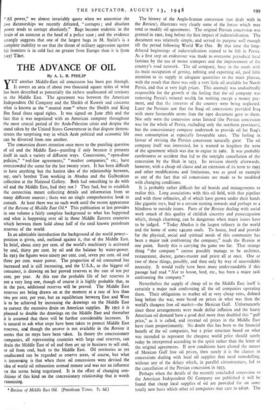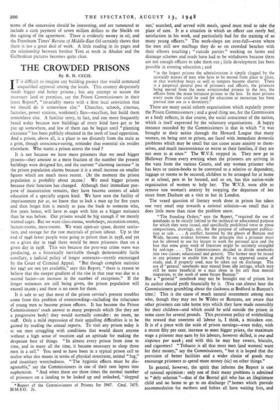THE ADVANCE OF OIL
By A. L. B. PHILIP
YET another Middle-East oil concession has been put through. It covers an area of about two thousand square miles of what has been described as potentially the richest unallocated oil territory in the Middle East. The agreement was between the American Independent Oil Company and the Sheikh of Koweit and concerns what is known as the "neutral zone" where the Sheikh and King Ibn Saud share equal rights. It was signed on June 28th and the fact that it was negotiated with an American company throughout the most crucial period of the Arab-Palestine crisis and despite the stand taken by the United States Government in that dispute demon- strates the surprising way in which Arab political and economic life can be divorced from one another.
The concession draws attention once more to the puzzling question of oil and the Middle East—puzzling if only because it presents itself in such a variety of different ways. Concessions, "open-door policies," "red-line agreements," "mother companies," etc., have overcrowded the scene for the last twenty years. It has been difficult to have anything but the haziest idea of the relationship between, say, one's brother Tom working in Abadan and the Gulbenkian collection at the National Gallery. Both had something to do with oil and the Middle East, had they not ? They had, but to establish the connection meant collecting details and information from so many different sources ; there was no single comprehensive book to consult. At least there was no such work until the recent appearance of the Review of Middle East Oil.* This publication at last provides in one volume a fairly complete background to what has happened and what is happening over oil in those Middle Eastern countries which between them hold about half of the total known petroleum reserves of the world.
In an admirable introduction the background of the world power— position is given, and, outlined against it, that of the Middle East. In brief, about sixty per cent, of the world's machinery is activated by coal, thirty per cent, by oil and the balance by water-power. In 1913 the figures were ninety per cent, coal, seven per cent. oil and three per cent. water power. The proportion of oil consumed has increased and is still increasing, and the U.S.A., as the biggest oil consumer, is drawing on her proved reserves at the rate of ten per cent, per year. At this rate the probable life of her reserves is not a very long one, though of course it is highly probable that, as in the past, additional reserves will be proved. The Middle East reserves are being drawn on at the moment at a rate of less than two per cent, per year, but an equilibrium between. East and West is to be achieved by increasing the drawings on the Middle East to correct the excessive drain on American supplies. By 1951 it is planned to double the drawings on the Middle East and thereafter it is assumed that there will be further considerable increases. It is natural to ask what steps have been taken to protect Middle East reserves, and though the answer is not available in the Review it seems that no steps have been taken. In theory the concessionary companies, all representing countries with large coal reserves, can drain the Middle East of oil and then set up in business to sell coal, or oil from coal, back to the Middle East. Oil territories as yet unallocated can be regarded as reserve areas, of course, but what is interesting is that when these oil concessions were devised the idea of world oil exhaustion seemed remote and was not an influence on the terms being negotiated. It is the effect of changing con- ditions of this kind on the concessionary relationship that is worth examining.
* Review of Middle East Off. (Petroleum Times. 7s. 6d.) The history of the Anglo-Iranian concession (not dealt with in the Review), illustrates very clearly some of the forces which may tend to modify oil agreements. The original Persian concession was granted in 19or, long before the first impact of industrialisation. The document was relatively simple, and served its purpose well enough till the period following World War One. By that time the long- delayed beginnings of industrialisation started to be felt in Persia. As a first step an endeavour was made to overcome periodical local famines by the use of motor transport and the improvement of the country's road network. The oil company, busy in the south with its main occupation of getting, refining and exporting oil, paid little attention to its supply in adequate quantities to the main plateau, with the result that there was only a very little oil available for North Persia, and that at very high prices. This anomaly was undoubtedly responsible for the growth of the feeling that the oil company was removing Persia's mineral wealth for nothing except a money pay- ment, and that the interests of the country were being neglected. Later the Persians saw that the Iraqi oil concessions provided Iraq with more favourable terms than the 19ot document gave to them. Not only were the concession areas limited (the Persian concession was for the whole of Persia, excluding only the northern provinces), but the concessionary company undertook to provide oil for Iraq's own consumption at especially favourable rates. The feeling in favour of revising the Persian concession naturally grew. The oil company itself was interested, for it wanted to lengthen the term of the agreement which was due to expire in 1961. It was probably carelessness or accident that led to the outright cancellation of the concession by the Shah in 1933. Its revision shortly afterwards, however, with a cheap oil clause and an extension of its term to 1993 and other modifications and limitations, was as good an example as any of the fact that oil concessions are made to be modified with changing conditions.
It is probably rather difficult for oil boards and managements to realise this. Long associations with this oil field, with that pipeline and with those refineries, all of which have grown under their hands like gigantic toys, lead to a certain turning inwards and perhaps to a blindness to outside issues. Parts of the Review dealing with social work smack of this quality of childish sincerity and preoccupation which, though charming, can be dangerous when major issues have to be judged. "Today Abadan is the largest refinery in the world and the home of some 140,000 souls. To house, feed and provide for the physical, social and spiritual needs of this community has been a major task confronting the company," reads the Review at one point. Surely this is carrying the game too far. That strange thing "the company" cannot possibly manage to be architect, restaurateur, doctor, games-master and priest all at once. One or two of these things, possibly, and then only by way of unavoidable necessity. It would really have been more understandable if this passage had read "Not to house, feed, etc., has been a major task confronting the company."
Nevertheless the supply of cheap oil to the Middle East itself is certainly a major task confronting all the oil companies operating there. Their obligations to market oil at very cheap rates, defined long before the war, were based on prices in what was then the world's cheapest free oil market—the Mexican Gulf. Unfortunately since those arrangements were made dollar inflation and the heavy American oil demand have a good deal more than doubled this "gulf price," as it is called, and internal oil prices in the Middle East have risen proportionately. No doubt this has been to the financial benefit of the oil companies, but a price structure based on what was intended to represent the cheapest world price should surely today be interpreted according to the spirit rather than the letter of the original agreements. If new conditions have altered the nature of Mexican Gulf free oil prices, then surely it is the clauses in concessions dealing with local oil supplies that need remodelling, without any of the delays which, in parallel circumstances, led to the cancellation of the Persian concession in 1933.
Perhaps when the details of the recently concluded concession to the American Independent Oil Company are published it will be found that cheap local supplies of oil are provided for on some totally new basis which other oil companies may care to adopt. The
terms of the concession should be interesting, and are rumoured to include a cash payment of seven million dollars to the Sheikh on the signing of the agreement. There is evidently money in oil, and the Petroleum Times' Review of Middle-East Oil certainly shows that there is too a great deal of work. A little reading in its pages and the relationship between brother Tom at work in Abadan and the Gulbenkian pictures becomes quite clear.



































 Previous page
Previous page